小学生动词,形容词, 名词变形汇总
小学英语语法 动词变形

小学动词变形1.动词原形(用于一般现在时,将来时)Like, make, see, go, have, be, do, love, eat, take, walk, touch, sing, dance, work, get, pass, watch, fix, wash, study, fly, cry, play, stay, talk, hope, marry, carry, stop, plan, drop, put, let, read, listen, cut, sit, say, buy, run, make, tell, write, draw, ride, fall, give, come, become, keep, sleep, hear, drink, begin2.动词的第三人称单数形式(用于一般现在时,且主语是第三人称单数时)①一般情况在词尾直接+sWork---works, get---gets, like---likes②以s, x, sh, ch, o结尾的词+esgo---goes, do---does, pass---passes, watch---watches, fix---fixes, wash---washes③以辅音字母+y结尾的词,变y为i再+esStudy---studies, fly---flies, cry---cries注意:元音字母+y结尾的词,直接+sPlay---plays,stay---stays3.动词的过去式(用于一般过去式)①一般情况在词尾直接+edTalk---talked, open---opened, want---wanted②以不发音的字母e结尾的词,在词尾+dLike---liked, love---loved, hope---hoped, dance---danced③以辅音字母+y结尾的词,变y为i再+edStudy---studied, marry---married, carry---carried, cry---cried④重读闭音节结尾的词,双写辅音字母再+edStop---stopped, plan---planned, drop---dropped⑤不规则变化Put---put, let---let, read---read, cut---cutBe(is, am)---was, be(are)---were, have---had, go---went, do---did, say---said, buy---bought, meet---met, find---found, tell---told, make---made, get---got, sit---sat, run---ran, eat---ate, write---wrote, take---took, ride---rode, see---saw, fall---fell, fly---flew, give---gave, draw---drew, come---came, become---became, keep---kept, sleep---slept, hear---heard, sing---sang, drink---drank, begin---began4.动词的现在分词(动词.ing)(用于现在进行时,固定搭配)①一般情况在词尾直接+ingTalk---talking, open---opening, sing---singing, sleep---sleeping②以不发音的字母e结尾的词,去e再+ingLike---liking, love---loving, have---having, write---writing, live---living, take---taking③重读闭音节结尾的词,双写辅音字母再+ingPut---putting, plan---planning, stop---stopping, run---running, swim---swimming, begin---beginning, get---getting。
名词变复数、形容词变副词、动词各种变化规则大全

名词变复数、形容词变副词、动词各种变化规则一、名词的常见5种复数变化形式
2.特殊名词的变化
二、形容词转化为副词的规律。
三、英语动词般现在时第三人称单数形式、现在分词、过去分词变化规律。
1.一般现在时第三人称单数形式的构成
2.现在分词的构成
3.规则动词的过去式、过去分词的构成
四、不规则动词变化规律
一、AAA型(原形→原形→原形)
二、ABA型(原形→过去式→原形)
三、ABC型
1. ow →ew →own
2. i→a →u
3. 原形→过去式→过去式+(e)n
4. 原形→过去式→原形+(e)n
5. 无规律
四、ABB型
1. 原形→ought →ought
2. 原形→aught →aught
3. 变其中一个元音字母
4. 原形→□lt→□lt
5. 变其中一个辅音字母
6.辅音字母和元音字母都变
五、AAB型
六、过去式、过去分词有两种形式
七、情态动词。
名词,动词,形容词变化规则
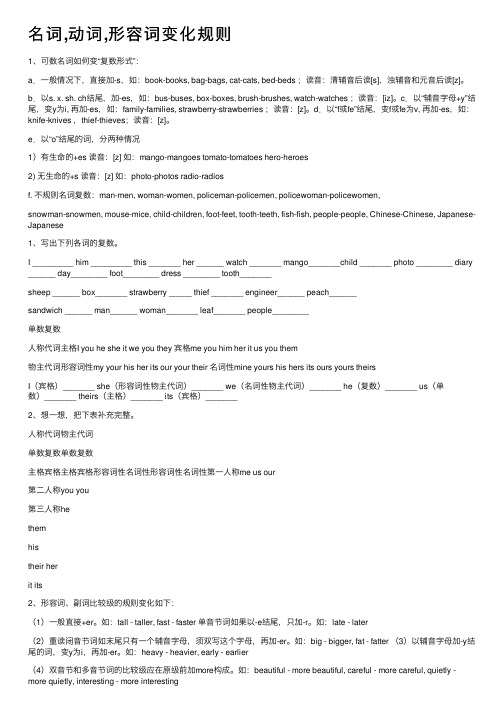
名词,动词,形容词变化规则1、可数名词如何变“复数形式”:a.⼀般情况下,直接加-s,如:book-books, bag-bags, cat-cats, bed-beds ;读⾳:清辅⾳后读[s],浊辅⾳和元⾳后读[z]。
b.以s. x. sh. ch结尾,加-es,如:bus-buses, box-boxes, brush-brushes, watch-watches ;读⾳:[iz]。
c.以“辅⾳字母+y”结尾,变y为i, 再加-es,如:family-families, strawberry-strawberries ;读⾳:[z]。
d.以“f或fe”结尾,变f或fe为v, 再加-es,如:knife-knives ,thief-thieves;读⾳:[z]。
e.以“o”结尾的词,分两种情况1)有⽣命的+es 读⾳:[z] 如:mango-mangoes tomato-tomatoes hero-heroes2) ⽆⽣命的+s 读⾳:[z] 如:photo-photos radio-radiosf. 不规则名词复数:man-men, woman-women, policeman-policemen, policewoman-policewomen,snowman-snowmen, mouse-mice, child-children, foot-feet, tooth-teeth, fish-fish, people-people, Chinese-Chinese, Japanese-Japanese1、写出下列各词的复数。
I _________ him _________ this _______ her ______ watch _______ mango_______child _______ photo ________ diary ______ day________ foot________ dress ________ tooth_______sheep ______ box_______ strawberry _____ thief _______ engineer______ peach______sandwich ______ man______ woman_______ leaf_______ people________单数复数⼈称代词主格I you he she it we you they 宾格me you him her it us you them物主代词形容词性my your his her its our your their 名词性mine yours his hers its ours yours theirsI(宾格)_______ she(形容词性物主代词)_______ we(名词性物主代词)_______ he(复数)_______ us(单数)_______ theirs(主格)_______ its(宾格)_______2、想⼀想,把下表补充完整。
小学英语素材-名词、动词、形容词、副词的六种变化规则 全国通用
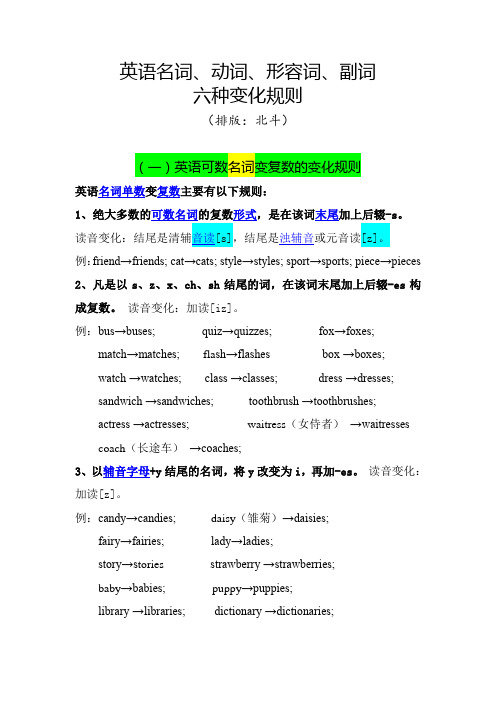
英语名词、动词、形容词、副词六种变化规则(排版:北斗)(一)英语可数名词变复数的变化规则英语名词单数变复数主要有以下规则:1、绝大多数的可数名词的复数形式,是在该词末尾加上后辍-s。
,结尾是浊辅音或元音读[z]。
例:friend→friends; cat→cats; style→styles; sport→sports; piece→pieces 2、凡是以s、z、x、ch、sh结尾的词,在该词末尾加上后辍-es构成复数。
读音变化:加读[iz]。
例:bus→buses;quiz→quizzes; fox→foxes;match→matches; fla sh→flashes box →boxes;watch →watches; class →classes; dress →dresses;sandwich →sandwiches; toothbrush →toothbrushes;actress →actresses;waitress(女侍者)→waitressescoach(长途车)→coaches;3、以辅音字母+y结尾的名词,将y改变为i,再加-es。
读音变化:加读[z]。
例:candy→candies;daisy(雏菊)→daisies;fairy→fairies; lady→ladies;story→s tories strawberry →strawberries;baby→babies; puppy→puppies;library →libraries;dictionary →dictionaries;cherry →cherries;activity →activities4、以-o结尾的名词(有生命的加es,无生命的加s)读音变化:加读[z]。
例:tomato→tomatoes;potato→potatoes;zoo→ zoos;piano→pianos;photo→photos;5、以-f或-fe结尾的名词,多为将-f或-fe改变为-ves,但有例外。
五年级下册总结四单元词形转换。

五年级下册总结四单元词形转换
1. 动词变名词:通过在动词前加上后缀-er, -or, -ist等来表示人或事物的名称。
例如:teach(教)- teacher(教师), sing(唱)- singer(歌手)。
2. 名词变动词:通过在名词前加上动词化的后缀-ize, -en
等来表示进行某种动作。
例如:sun(太阳)- sunbathe(晒
太阳), child(孩子)- childproof(使适合小孩)。
3. 形容词变副词:通过在形容词后加上后缀-ly来表示程度
或方式。
例如:quick(快速的)- quickly(快速地), careful(小心的)- carefully(小心地)。
4. 动词变过去式:大部分动词的一般过去式是在动词原形后
加上-ed。
例如:play(玩)- played(玩过), walk(走)- walked(走过)。
5. 名词变复数:大部分名词的复数形式在词尾加上-s或-es。
例如:book(书)- books(书籍), box(盒子)- boxes
(盒子)。
这些是五年级下册四个单元的词形转换总结。
希望对你有帮助!。
英语动词、名词、形容词变化规则只是分享
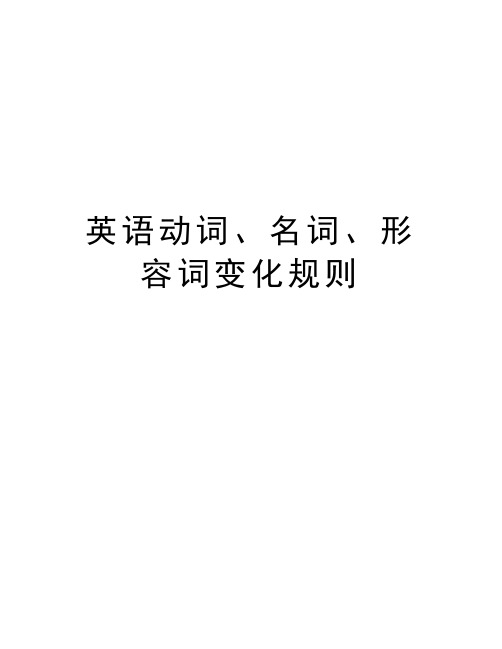
英语动词、名词、形容词变化规则动词第三人称单数变化规则1) 一般情况下,动词后面直接加 -s. 例如: works gets says reads2) 以ch,sh,s,x 或 o 结尾的动词,在后面加 -es。
例如:go-goes teach-,teache wash-washes brush-brushes ,catch-catches ,do-does ,fix -fixes 3) 以辅音字母 + y结尾的动词,把 y变为 i 再加 -es. 例如:study- studies try-tries carry-carries ,fly-flies cry-cries现在分词变化规则1、现在进行时的构成现在进行时由"be+v-ing"构成。
be应为助动词,最容易被同学漏掉,它应与主语的人称和数保持一致。
2、现在进行时的应用(1)当句子中有now时,常表示动作正在进行,这时要用现在进行时。
如:They are playing basketball now.现在他们正在打篮球。
(2)以look, listen开头的句子,提示我们动作正进行,这时要用现在进行时。
如:Listen!She is singing an English song.听,她正在唱英语歌。
(3)表示当前一段时间或现阶段正在进行的动作,且此时有this week, these days等时间词,这时常用现在进行时。
如:We are making model planes these days.这些天我们在做飞机模型。
(4)描述图片中的人物的动作,也为了表达更生动。
此时也常用现在进行时。
如:Look at the picture. The children are flying kites in the park.看这幅图,那些孩子正在公园放风筝。
3、现在分词的变化规则:(1)一般情况下,直接在动词后加-ingwork ---- workingsleep ----- sleepingstudy ----- studying(2)动词以不发音的-e结尾,要去-e加-ingtake ----- takingmake ----- makingdance ----- dancing(3)重读闭音节的动词,要双写词尾字母,再加-ingcut ----- cuttingput ----- puttingbegin ------ beginning(4)以-ie结尾的动词,把变成y再加-inglie ----- lyingtie ----- tyingdie ----- dying4、现在进行时的变化肯定句式:主语+be( am, is, are)+现在分词+其它.否定句式:主语+be(am, is, are) +not +现在分词+其它.一般疑问句:be(am, is, are) +主语+现在分词+其它特殊疑问句:疑问词+be(am, is, are)+主语+现在分词+其它① 一般单音节词末尾加er 和est② 单音节词如果以e结尾,只加r 和st③ 闭音节单音节词如末尾只有一个辅音字母,须先双写这个辅音字母,再加er和est④ 少数以y,er(或ure),ow,ble结尾的双音节词,末尾加er和est(以y结尾的词,如y前是辅音字母,把y变成i,再加er和est,以e结尾的词仍加r和st)difficult more difficult most difficultinteresting more interesting most interestinguseful more useful most useful3. 用比较级时常用than引起一个从句,表示和什么比较:His room is bigger than mine. 他的房间比我的房间大。
小学1-6年级英语所有词汇的变化

词汇的变化一、单数名词变复数的变化规律:1.一般情况下,在单词后加“s”,如:balls、birds2.以“s、x、ch、sh”结尾的单词加“es”,如:boxes、dresses3.以“o”结尾的、汉语意思是代表生命的东西时在结尾加“es”,如:potatoes4.结尾以辅音字母加y结尾的去掉“y”加“ies”,如:country——countries5.固定变化:child------children二、动词变成“单三”形式的变化规律:1. 一般情况下,在动词后加“s”,如:wants、plays2.以“s、x、ch、sh”结尾的在动词后加“es”,如:watches、finishes3.以“o”结尾的在动词加“es”,如:goes、does4.结尾以辅音字母加y结尾的去掉“y”加“ies”,如:fly——flies、cry——cries 4.固定的变化,如:have------has三、动词变成现在分词的变化规律:1.动词以“e”结尾的把“e”去掉加“ing”2.直接加“ing”四、动词变成过去式的变化规律:1.记住固定的特殊变化动词,如:go——went2.在动词结尾直接加ed,如:opened3. 动词以“e”结尾的直接加“d”1.一般变化的名词:birds------birds panda------pandas boy------boys girl------girlsball------balls colour------colours classroom------classroomswindow------windows door------doors desk------desks seat------seatsteacher------teachers cat------cats dog------dogs school bag------school bagspen------pens ruler------rulers book------books pencil------pencilseraser------erasers crayon------crayons kite------kites house-------houseshat------hats bed------beds balloon-------balloons bear-------bears2.特殊变化的名词及其变法:pencil-box------pencil-boxes fox------foxes box------boxes二、必须、一定要与“an”做朋友的名词:an eraser三、动词的变化1.动词“单三”的变化:stand------stands open------opens sit------sits point-------points look------looks thank------thanks2.现在分词的变化:(1)一般变化:stand------standing open------opening point-------pointing look------looking(2)特殊变化:sit------sitting thank------/3.过去式的变化:(1)一般变化:open------opened point-------pointed look------looked thank------thanked(2)特殊变化:stand-----stood sit------sat1.一般变化的名词:tree------trees birds------birds father------fathers mother------mothersgrandpa------grandpas grandma------grandmas sister------sistersbrother------brothers friend------friends doctor-------doctors pupil------pupilsbag------bags coat------coats nurse------nurses driver------drivershead------heads face------faces nose------noses ear------ears eye------eyesleg------legs cow------cows farm-------farms pig------pigs chicken------chickens egg------eggs snake------snakes lion------lionsfootball------footballs basketball------basketballs ping-pong------ping-pongssport------sports ice cream------ice creams present-------presents car------cars2.特殊变化的名词及其变法:dress------dresses bus------buses baby------babies zoo-----zoos3.以复数形式出现的名词:noodle------noodles sweet------sweets4.不可数名词meat rice5.固定变法:child------children二、必须、一定要与“an”做朋友的名词(以元音因素开头的单词):an ice cream an egg an ear an eye三、动词的变化1.动词“单三”的变化:know------knows swim------swims play------plays like-------likes dance------dances2. 现在分词的变化:(1)一般变化:play------playing(2)特殊变化:swim------swimming dance------dancing know------/ like-------/3.过去式的变化:(1)一般变化:play------played(2)特殊变化:know------knew swim------swam like-------liked dance------danced1.一般变化的名词:song------songs jigsaw-----jigsaws bike------bikes toy------toys T-shirt-----T-shirts shirt------shirts shoe------shoes film-----films train----trains dinner-----dinners(一般单数)weekend------weekends park---parksship----ships plane-----planes jacket----jackets sweater--------sweaters2.特殊变化的名词及其变法:party-----parties city-------cities3.以复数形式出现的名词:trousers4.集合名词(代表一类事物):clothes5.无复数变化的名词:hair二、动词的变化1.动词“单三”的变化:(1)一般变化:run-----runs play------plays come-----comes read----reads listen----listens want----wants live----lives walk-----walks love----loves wear-----wears eat------eats sing-----sings get------gets(2)特殊变化:have------has go-----goes watch----watches2. 现在分词的变化:(1)一般变化:play------playing read-----reading listen-----listening walk----walking wear-----wearing eat------eating sing------singing go----going watch----watching(2)特殊变化:run-----running come-----coming want-----/ live----living love-----loving get----getting have-----having3.过去式的变化:(1)一般变化:play------played listen-----listened walk----walked watch-----watched want----wanted(2)特殊变化:read----read wear-----wore eat-----ate sing----sang go------went run-----ran come-------come live-----lived love-----loved get------got have------had1.一般变化的名词:radio----radios photo----photos newspaper------newspapers camera----cameraspicture-----pictures letter----letters colour-------colours room-----roomssecret------secrets card-----cards flower-----flowers game-----games Sunday------Sunday(表示多个星期天)thing------things poem-----poemshill-----hills hospital------hospitals lake------lakes road-----roadscousin------cousins supermarket-------supermarkets2.特殊变化的名词及其变法:class-----classes factory-----factories3.集合名词(代表一类事物):homework二、动词的变化1.动词“单三”的变化:(1)一般变化:like----likes rain----rains snow-----snows smile-----smiles draw----drawswrite-----writes colour------colours drink-----drinks talk----talks skip---skipshide----hides seek-----seeks help----helps cook----cooks say-----sayssleep-----sleeps stop-----stops see-----sees turn------turns(2)特殊变化:tidy-----tidies do----does catch-----catches fly-----flies touch-----touches2.现在分词的变化:(1)一般变化:rain------raining snow------snowing draw-----drawing colour----colouringdrink-----drinking talk---talking seek---seeking help----helping cook---cookingsay-----saying sleep----sleeping see-----seeing turn-----turning tidy-----tidying do----doing catch-----catching fly-------flying touch-----touching(2)特殊变化:like----liking smile----smiling write------writing skip----skippinghide-----hiding stop-----stopping3.过去式的变化:(1)一般变化:rain----rained snow----snowed colour----coloured talk-----talked help----helpedcook----cooked turn--------- turned touch----touched(2)特殊变化:draw-----drew drink------drank seek-----sought say----said sleep----sleptsee----saw tidy-----tidied do-----did catch-----caught fly---fliedlike----liked smile----smiled write------writed skip-----skipped hide---hid stop-----stopped1.一般变化的名词:fork-----forks hamburger----hamburgers cake-----cakes idea----ideasdragon boat--------dragon boats lake-----lakes shop------shops biscuit-----biscuits computer game-----computer games jigsaw------jigsaws puzzle------puzzles pet----petstext----texts Friday-------Fridays stone-----stones animal------animalselephant-----elephant horse-----horses race----races airport----airportssea-----seas Saturday--------Saturdays2.特殊变化的名词及其变法:mouse-------mice man------men woman----women3.以复数形式出现的名词:chopsticks sports people二、必须、一定要与“an”做朋友的名词(以元音因素开头的单词):an idea an animal an elephant an airport三、动词的变化1.动词“单三”的变化:(1)一般变化:use----uses make----makes row----rows feed----feeds jump---jumps cough----coughsvisit----visits instead----insteads see----sees(2)特殊变化:can----/ worry----worries fix-----fixes2. 现在分词的变化:(1)一般变化:row----rowing feed----feeding jump----jumping cough---coughing visit---visiting instead----insteading see-----seeing worry----worrying fix----fixing(2)特殊变化:can----/ use----using make------making3.过去式的变化:(1)一般变化:row-----rowed jump----jumped fix---fixed cough----coughed visit----visitedinstead-----insteaded(2)特殊变化:use----used make----made feed---fed can---could see---saw worry---worried1.一般变化的名词:river----rivers clock----clocks tiger----tigers phone----phones writer----writersfruit----fruits apple----apples pear---pears orange----oranges work----worksgrandparent----grandparents floor----floors vegetable----vegetables day---daysTuesday----Tuesdays Wednesday---Wednesdays Thursday---ThursdaysMonday---Mondays different---differents hundred----hundreds2.特殊变化的名词及其变法:peach----peaches policeman-----policemen3.不可数名词:milk二、必须、一定要与“an”做朋友的名词(以元音因素开头的单词):an apple an orange an ear an eye三、动词的变化1.动词“单三”的变化:(1)一般变化:phone---phones speak----speaks say----says find---finds take---takes(2)特殊变化:try---tries2. 现在分词的变化:(1)一般变化:speak----speaking say---saying find---finding try----trying(2)特殊变化:phone----phoning take----taking3.过去式的变化:(1)一般变化:phone---phoned(2)特殊变化:speak---spoke say----said find----found try----tried take---took1.一般变化的名词:bicycle----bicycles mountain----mountains monster-----monsters cup---cups watermelon-----watermelons knee---knees finger-----fingers matters2.不可数名词:paper gold medicine3.集合名词(代表一类事物):American food二、动词的变化1.动词“单三”的变化:(1)一般变化:tell----tells dance----dances clean----cleans learn----learns invent---inventsprint----prints buy----buys climb----climbs fall---falls hurt----hurts skate—skates break----breaks win---wins practise-----practises put---putride----rides cut---cuts(2)特殊变化:finish---finishes wash---washes cry------cries2. 现在分词的变化:(1)一般变化:tell---telling clean----cleaning learn---learning invent----inventing buy---buying print----printing climb---climbing fall-----falling break---breakingfinish------finishing wash----washing cry----crying(2)特殊变化:dance----dancing hurt----/ skate-----skating win----winning put---putting practice----practising cut----cutting ride----riding3.过去式的变化:(1)一般变化:clean----cleaned invent------invented print----printed climb----climbedfinish----finished wash----washed(2)特殊变化:tell----told learn---learnt buy-----bought fall----fell break----broke cry----cried dance----danced hurt-----hurt skate---skated win----won put----putpractice----practised cut---cut ride-----rided1.一般变化的名词:machine---machines duck---ducks thousand----thousands village----villages field-----fields concert----concerts CD----CDs message----messagesreport-----reports planet-----planets ring----rings night----nights map---maps banana-----bananas cousin----cousins capital-----capitals language---languages postcard-----postcards granddad-----granddads restaurant----restaurants2.特殊变化的名词:potato---potatoes wolf----wolves sheep---sheep country---countriesleaf(叶子单数)----leaves3.不可数名词:grass4.独一无二的食物其名词不变复数且前面必去加“the”:space moon sun5.常以复数形式出现:glasses leaves(叶子,注意区别于“离开”的“单三”形式“leaves”)二、动词的变化1.动词“单三”的变化:wait----waits choose---chooses shout----shouts laugh-----laughs lie----lies end----ends clap----claps happen---happens meet----meets send---sends2. 现在分词的变化:(1)一般变化:wait----waiting shout----shouting laugh----laughing end----endinghappen----happening meet---meeting send---sending(2)特殊变化:choose----choosing lie---lying clap----clapping3.过去式的变化:(1)一般变化:wait----waited shout----shouted laugh----laughed end---endedhappen-----happened(2)特殊变化:choose----chose lie---lied clap----clapped meet----meet send----sent1.一般变化的名词:year---years duck----ducks playground----playgrounds restaurant---restaurants night----nights invitation------invitations skirt----skirts point----pointsteam---teams fire----fires line-----lines rule-----rules2.常以复数形式出现:morning exercise3.不可数名词:water二、必须、一定要与“an”做朋友的名词:an invitation三、动词的变化:1.动词“单三”的变化:(1)一般变化:lift---lifts sell---sells hear----hears break----breaks(2)特殊变化:reply------replies miss-----misses study-----studies2. 现在分词的变化:lift----lifting sell----selling hear----hearing break----breaking reply---replying miss----missing study----studying3.过去式的变化:(1)一般变化:lift----lifted miss----missed(2)特殊变化:sell----sold hear-----heard break----broke reply----replied study----studied五年级下——第十册一、名词的变化1.一般变化的名词:flute----flutes player----players office----offices parent----parents email---emails season----seasons hand---hands circle----circles message----messages piece—pieces theatre----theatres room----rooms question-----questions ticket----ticketsbuilding----buildings place----places2.特殊变化的名词:sandwich----sandwiches man-----men woman----women toothbrush---toothbrushes 3.不可数名词:paper chocolate4.常以复数形式出现的名词:scissors二、动词的变化1.动词“单三”的变化:(1)一般变化:drive----drives return-----returns borrow----borrows send----sends get---getsbuild---builds solve----solves hope----hopes think----thinks draw----draws leave-----leaves(2)特殊变化:carry----carries2. 现在分词的变化:(1)一般变化:return-------returning borrow-----borrowing send----sending build---building(动词)think----thinking draw-----drawing carry---carrying(2)特殊变化:drive-----driving get----getting solve----solving hope-----hopingleave----leaving3.过去式的变化:(1)一般变化:return----returned borrow----borrowed(2)特殊变化:send----sent build----built think----thought draw----drew carry----carried drive----drove get---got solve---solved hope---hoped leave---left1.一般变化的名词:thousands-----thousands kilometer-----kilometers million----millions stamp—stamps building---buildings surprise-----surprises restaurant------restaurants coconut---coconuts different---differents weekend----weekends album----albums present----presents week---weeks kangaroo----kangaroos way----ways line----lines2.特殊变化的名词:city----cities bookshelf------bookshelves address-----addresses3.固定变化的名字:child-----children4.常以复数形式出现的名词:chopsticks5.代表独一无二的事物不变复数:world(特殊情况下加“s”)6.抽象名词不变复数:peace二、动词的变化1.动词“单三”的变化:(1)一般变化:collect----collects hear----hears choose----chooses bring----brings answer--answers (2)特殊变化:finish----finishes copy---copies tidy----tidies2. 现在分词的变化:(1)一般变化:collect---collecting hear----hearing bring----bringing answer----answeringfinish-----finishing copy----copying tidy----tidying(2)特殊变化:choose----choosing3.过去式的变化:(1)一般变化:collect---collected answer-----answered finish----finished(2)特殊变化:choose----chose copy----copied bring----brought tidy---tidied hear----heard1.一般变化的名词:hot-dog------hot-dogs dollar---dollars cent----cents duck----duckssupermarket----supermarkets spaceship----spaceships model----models video---videosmatter----matters baseball-----baseball team-----teams mistake-----mistakesstudent------students2.特殊变化的名词:waitress----waitresses party-------parties3.泛指一类事物不变复数:middle school4.代表独一无二的事物不变复数:space二、动词的变化1.动词“单三”的变化:(1)一般变化:enjoy-----enjoys hold-----holds fall---falls clap----claps travel----travelsspend-----spends(2)特殊变化:shine----shines carry----carries arrive----arrives study-----studies2. 现在分词的变化:(1)一般变化:enjoy-----enjoying hold-----holding fall---falling spend-----spending carry----carrying study-----studying travel----traveling(2)特殊变化:clap----clapping shine----shining arrive----arriving3.过去式的变化:(1)一般变化:enjoy-----enjoyed hold-----held(2)特殊变化:fall---fell spend-----spent carry----carried study-----studied clap----clappedtravel----traveled shine----shined arrive----arrived。
动词,名词,代词,形容词,副词,冠词
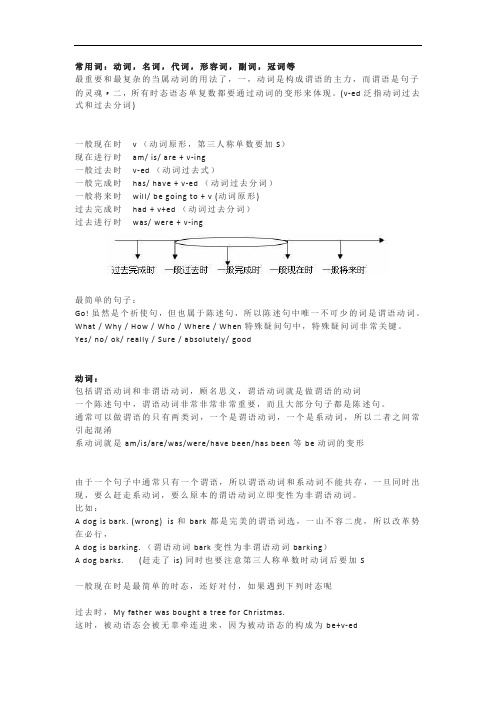
常用词:动词,名词,代词,形容词,副词,冠词等最重要和最复杂的当属动词的用法了,一,动词是构成谓语的主力,而谓语是句子的灵魂二,所有时态语态单复数都要通过动词的变形来体现。
(v-ed泛指动词过去式和过去分词)一般现在时 v (动词原形,第三人称单数要加S)现在进行时 am/ is/ are + v-ing一般过去时 v-ed (动词过去式)一般完成时 has/ have + v-ed (动词过去分词)一般将来时 will/ be going to + v (动词原形)过去完成时 had + v+ed (动词过去分词)过去进行时 was/ were + v-ing最简单的句子:Go! 虽然是个祈使句,但也属于陈述句,所以陈述句中唯一不可少的词是谓语动词。
What / Why / How / Who / Where / When 特殊疑问句中,特殊疑问词非常关键。
Yes/ no/ ok/ really / Sure / absolutely/ good动词:包括谓语动词和非谓语动词,顾名思义,谓语动词就是做谓语的动词一个陈述句中,谓语动词非常非常非常重要,而且大部分句子都是陈述句。
通常可以做谓语的只有两类词,一个是谓语动词,一个是系动词,所以二者之间常引起混淆系动词就是am/is/are/was/were/have been/has been等be动词的变形由于一个句子中通常只有一个谓语,所以谓语动词和系动词不能共存,一旦同时出现,要么赶走系动词,要么原本的谓语动词立即变性为非谓语动词。
比如:A dog is bark. (wrong) is和bark都是完美的谓语词选,一山不容二虎,所以改革势在必行,A dog is barking. (谓语动词bark变性为非谓语动词barking)A dog barks. (赶走了is) 同时也要注意第三人称单数时动词后要加S一般现在时是最简单的时态,还好对付,如果遇到下列时态呢过去时,My father was bought a tree for Christmas.这时,被动语态会被无辜牵连进来,因为被动语态的构成为be+v-ed过去时中动词全部是v-ed形式出现,不规则动词除外,很容易让人联想到被动语态。
小学语文名词、动词、形容词知识点你还记得吗?给孩子看看

小学语文名词、动词、形容词知识点你还记得吗?给孩子看看今天就把小学语文中的名词、动词和形容词也拿出来再讲解一下,方便大家“复习”;一.名词表示人和事物的名称叫名词。
如:'黄瓜、猪、羊、白菜、拖拉机、计算机'。
1、表示专用名称的叫做'专用名词',如'上海、李白、白居易,中国'。
2、表示抽象事物的名称的叫做'抽象名词',如'范畴、思想、质量、品德、品质、友谊、方法'。
3、表示方位的叫做'方位名词',如'上''下''左''右''前''后''中''东''西''南''北''前面''后边''东边''南面''中间'等。
二.动词动词表示人或事物的动作、行为、发展、变化。
1、有的动词表示一般的动作,如'来、去、说、走、跑、吼、叫、学习、起飞、审查、认识'等。
2、有的动词表示心理活动,如'想、重视、注重、尊敬、了解、相信、佩服、惦念'等,这样的动词前面往往可以加上'很、十分'。
3、有的动词表示能够、愿意这些意思,叫做'能愿动词',它们是'能、要、应、肯、敢、得(dei)、能够、应该、应当、愿意、可以、可能、必须',这些能愿动词常常用在一般的动词前面,如'得去、能够做、可以考虑、愿意学习、应该说明、可能发展'。
4、还有一些动词表示趋向,叫做'趋向动词',如'来、去、上、下、进、出、上来、上去、下来、下去、过来、过去、起;,它们往往用在一般动词后面表示趋向,如'跳起来、走下去、抬上来、跑过去'。
英语变形规律总结

英语变形规律总结英语单词的变形规律可以总结为以下几个方面:1. 名词的复数形式英语中大部分名词的复数形式是在词尾加上-s,例如:book-books, cat-cats, dog-dogs等。
但也有一些名词有不规则的复数形式,例如:child-children, mouse-mice, foot-feet等。
2. 动词的时态变化英语中的动词有三种基本时态:现在时、过去时和将来时。
在现在时,动词原形和第三人称单数形式是一样的,例如:I walk to school. He walks to school. 在过去时,大部分动词的过去式是在原形后加-ed,例如:I walked to school yesterday. He watched TV last night. 但也有一些动词的过去式是不规则的,例如:go-went, eat-ate等。
在将来时,动词前要加will或shall,例如:I will go to school tomorrow. They shall come to visit us next week.3. 形容词和副词的比较级和最高级形式形容词和副词的比较级和最高级形式都是通过在词尾加上-er和-est来表示的。
例如:big-bigger-biggest, fast-faster-fastest。
但也有一些形容词和副词的比较级和最高级形式是不规则的,例如:good-better-best, well-better-best等。
4. 不规则动词的变化规律在英语中,有一些动词的变化规律是不规则的,例如:go-went-gone, eat-ate-eaten等。
这些动词的过去式和过去分词形式都不是在原形后加-ed,而是需要记忆。
总之,英语单词的变形规律需要仔细学习和记忆,只有通过大量的练习才能掌握得更加熟练。
英语动词、名词、形容词变化规律

动词后+ -ed的变化规则1、一般情况下,动词词尾加-ed,如:work ---worked play---played wanted----wanted act----acted2、以不发音的-e 结尾动词,动词词尾加-d,如:live---lived move----moved taste---tasted hope---hoped3、以辅音字母+ y结尾的动词,把-y变为-i 再加-ed,如:study---studied copy---copied cry---cried carry---carried4、以一个辅音字母结尾的重读闭音节动词,双写词尾辅音字母,再加-ed,如:stop ---stopped5、不规则动词的过去式变化规律性不强,须多加记忆。
go – went make – made get –got buy - bought come - came fly-flew1begin—23draw—)45678910.以bring—11.以—would 1213hear〔hi14〕15am,is——flew,go—went—saw,take—took过去式“-ed”的发音规则(1)动词词尾为“t,d”时,发/ id /音,want →wanted (要)need →needed (需要)(2)动词词尾为清辅音时,发/ t / 音。
help →helped (帮助)laugh →laughed (笑)look →looked (看)kiss →kissed (吻)wash →washed (洗)watch →watched (注视)(3)动词词尾为t,d以外之浊辅音或元音时,发/ d /音。
call →called (叫)stay→stayed (停留)cry→cried (哭)动词过去式变化规则一、规则变化1、一般情况下,动词词尾加-ed, 如:work—worked play—played want—wanted ask—asked2、以不发音的-e结尾动词,动词词尾加-d, 如:live—lived move—moved taste—tasted3、以“辅音字母+y”结尾的动词,把y改成i, 加—ed, 如:study—studies try—tried copy—copied carry—carried4、重读闭音节动词,双写词尾辅音字母,再加—ed, 如:stop—stopped二、不规则变化is am—was are—were do—did have has—had go—went meet—met come—came take—took steal—stole eat—ate fly—fliew run—ran see—saw say—said make—made find—found stand—stood sit—sat sing—sang drink—drank give—gave ring—rang swim—swamwrite—wrote ride—rode drive—drovedraw—drew grow—grew know—knewget—got forget—forgotsweep—swept keep—kept sleep—sleptspeak—spoke break—broketell—told sell—soldbuy—bought think—thought catch—caught teach—taught build—builtcan—1、2、3、4、[t][d]1,stand—2.以-e(1write—having,save—(2)以die—(3)以see——eyeing (4)以sue—suing,imbue—imbuing,construe—construing,pursue—pursuing,rue—ruing有时,词尾e可去掉也可保留:glue—gluing或glueing,cue—cuing或cueing,blue—blueing或bluing,true—truing或trueing,clue—clueing或cluing3.以一元音加一辅音结尾的动词(1)如果动词最后一音节为重读闭音节,最后一个字母需要重复:run—running,stop—stopping,hop—hopping,plan—planning,star—starring,control—controlling 但辅音x是个例外,无需重复(x其实起着两个辅音的作用):tax—taxing,relax—relaxing(2)如果动词最后一个音节为次重读音节,最后一个字母有时也重复:kidnap—kidnapping或kidnaping,program—programming或programing(3)如果动词最后一个音节为非重读音节,最后一个字母大多无需重复:open—opening,offer—offering,audit—auditing但在有些动词中,重复或不重复均可:worship—worshiping或worshipping,focus—focusing或focussing,cancel—canceling或cancelling,travel—traveling或travelling以非重读的-el结尾的动词加-ing时,英国英语习惯于重复词尾l,而美国英语则习惯于不重复1。
单词变形大全
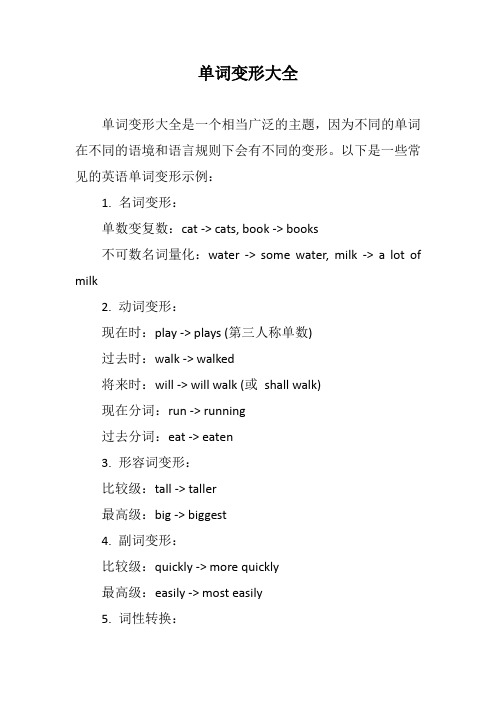
单词变形大全单词变形大全是一个相当广泛的主题,因为不同的单词在不同的语境和语言规则下会有不同的变形。
以下是一些常见的英语单词变形示例:1. 名词变形:单数变复数:cat -> cats, book -> books不可数名词量化:water -> some water, milk -> a lot of milk2. 动词变形:现在时:play -> plays (第三人称单数)过去时:walk -> walked将来时:will -> will walk (或shall walk)现在分词:run -> running过去分词:eat -> eaten3. 形容词变形:比较级:tall -> taller最高级:big -> biggest4. 副词变形:比较级:quickly -> more quickly最高级:easily -> most easily5. 词性转换:名词转形容词:sun (n.) -> sunny (adj.)形容词转副词:slow (adj.) -> slowly (adv.)动词转名词:write (v.) -> writer (n.)6. 缩写与简写:I am -> I'mcannot -> can'the will -> he'll7. 所有格变形:单数名词所有格:my book -> the book of mine/mine (缩略)复数名词所有格:our cars -> the cars of ours/ours (缩略)请注意,还有许多其他变形规则和特例,具体取决于所使用的语言。
语言一直在发展变化,英语单词变形也不例外。
新版小学英语词形转换总结.pdf

小学英语词形转换语法小结一、名词的复数(动词的第三人称单数形式)1、以s,x, ch, sh结尾的加es。
box—boxes, watch--watches2、以辅音加y结尾的去y变i加es。
strawberry—strawberries,3、以fe,f结尾的,把fe,f变成ve,加s。
knife—knives, wife—wives,4、一般情况加s。
boy—boys, chair--chairs5、特殊词 man—men , woman—women , foot—feet, tooth—teeth, people-people mouse—mice,二、动词变名词(直接加“er”,以字母“e”结尾的加“r”)1.teach—teacher,2.work—worker,3.swim—swimmer,4.drive—driver5.play—player6.speak—speaker7.write—writer8.run-runner三、动词变单三规律在清辅音后发音为[s],在浊辅音及元音后发音为[z]。
如:1、大多数动词在词尾加“S”①stop-stops [s] ; make-makes [s]②read-reads [z] ; play-plays [z],然后在加“es”变为“i”读[iz] 如:结尾的,要先将“y”2、以辅音字母加“y”fly-flies [z];carry-carries [z]study-studies [z]; worry-worries,发音为[iz] 如:teach-teaches [iz];3、以“s, x, ch, sh”结尾的,在词尾加“es”结尾的动词,加“es”,读[z] 如:go-goes [z] do-does [z]4、以“o”5、还有一个特殊变化需要我们特别记住: have的单三形式为has四、小学英语动词的现在分词变化规则1.一般在词尾加“-ing”help-helping2.以不发音e结尾的词,先去e,再加“-ing”例如:live-living3以ie结尾的动词,先将ie变为y,再加ing。
英语词形变化

英语词形变化1. 时态变化- 动词根据时间线改变形式。
- Present: walk- Past: walked- Future: will walk2. 语态变化- 动词根据主语和动作的关系改变形式。
- Active: He eats the cake.- Passive: The cake is eaten by him.3. 数的变化- 名词和动词根据主语的数量改变形式。
- Singular: cat- Plural: cats4. 人称变化- 动词根据主语的人称改变形式。
- First person singular: I eat- Second person singular: You eat- Third person singular: He/She/It eats5. 性变化- 形容词和代词在某些情况下根据性别改变形式。
- Masculine: actor- Feminine: actress6. 格变化- 名词和代词根据它们在句子中的功能改变形式(这在现代英语中不如古英语中明显)。
- Nominative: He (subject)- Accusative: Him (object)7. 比较级和最高级- 形容词和副词根据比较的程度改变形式。
- Positive: happy- Comparative: happier- Superlative: happiest8. 名词所有格- 表示所有关系时,名词会改变形式。
- Singular: John's book- Plural: The children's books以下是一些具体的例子:- 动词变化:- Present Simple: She **eats** an apple.- Past Simple: She **ate** an apple.- Present Continuous: She is **eating** an apple.- Past Continuous: She was **eating** an apple.- Present Perfect: She has **eaten** an apple.- Past Perfect: She had **eaten** an apple.- 名词变化:- Singular: The **cat** is sleeping.- Plural: The **cats** are sleeping.- 形容词变化:- Positive: This is a **happy** dog.- Comparative: This dog is **happier** than that one.- Superlative: This is the **happiest** dog I've ever seen.。
小学五。六年级英语语法汇总)
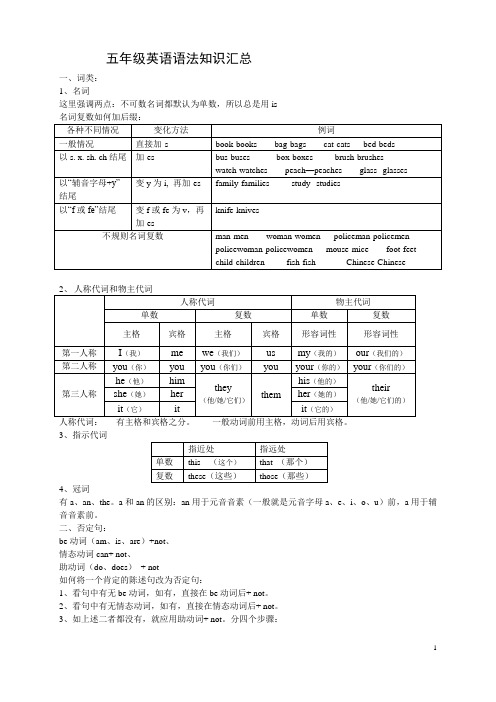
五年级英语语法知识汇总一、词类:1、名词这里强调两点:不可数名词都默认为单数,所以总是用is名词复数如何加后缀:人称代词:有主格和宾格之分。
一般动词前用主格,动词后用宾格。
3、指示代词4、冠词有a、an、the。
a和an的区别:an用于元音音素(一般就是元音字母a、e、i、o、u)前,a用于辅音音素前。
二、否定句:be动词(am、is、are)+not、情态动词can+ not、助动词(do、does)+ not如何将一个肯定的陈述句改为否定句:1、看句中有无be动词,如有,直接在be动词后+ not。
2、看句中有无情态动词,如有,直接在情态动词后+ not。
3、如上述二者都没有,就应用助动词+ not。
分四个步骤:(1)肯定陈述句中本来是没有助动词的,要加上去,位置在主语(某人或某物)后,动词前。
(2)确定助动词用do、does,根据句中动词,动词是原形的助动词就用do,动词是第三人称单数的助动词就用does,(3)在助动词后加not。
(4)原句中动词假如发生变化就要恢复成原形。
强调一点,有some的要考虑是否要用any。
三、一般疑问句。
如何将一个肯定的陈述句改为一般疑问句:1、看句中有无be动词,如有,把be动词提到句首即可。
2、看句中有无情态动词,如有,把情态动词提到句首即可。
3、如上述二者都没有,就应把助动提到句首。
分四个步骤:(1)肯定陈述句中本来是没有助动词的,要加上去,位置在主语(某人或某物)后,动词前。
(2)确定助动词用do还是does,根据句中动词,动词是原形的助动词就用do,动词是第三人称单数的助动词就用does(3)把助动词后提到句首。
(4)原句中动词假如发生变化就要恢复成原形。
强调一点,有some的要考虑是否要用any。
四、特殊疑问句。
表示疑问,有疑问词(在开头),回答有很多种可能。
1、一般现在时(1)一般现在时中的be动词:一般用原形:am is aream用于第一人称单数(I);is用于第三人称单数(he she it和其他人名或称谓,如:Ben his sister 等);are用于第二人称单数(you)和所有复数(包括第一人称复数we、第二人称复数you;第三人称复数they和其他复数,如the children 、his parents等)。
英语形容词,名词,动词,副词 互变方法规律

英语形容词,名词,动词,副词互变方法规律一.名词变形容词:1.名词后加-y, 如:luck→lucky, cloud→cloudy; wind→windy; rain→rainy; sun→sunny, snow→snowy noise-noisy health→healthy2.在名词后加-ly, 如:friend→friendly love→lovely day→daily3.方位名词加-ern,如:east→eastern west→westernsouth→southern north→northern二.动词变形容词1.词尾加ful:use - useful, care - careful, help - helpful,thank - thankful peace - peaceful,forget - forgetful, play - playful,succeed - successful, wonder - wonderful2.词尾加d或ed:please - pleased, unite - united, excite - excited, surprise - surprised, organize - organized, close - closed, wound - wounded, relax - relaxed,develop - developed, appreciate - appreciated,frustrate - frustrated, interest - interested, annoy - annoyed, use - used, frighten - frightened, crowd - crowded, thrill - thrilled, pollute - polluted3.词尾加ing:interest - interesting,surprise - surprising,excite - excitingdevelop - developing,frighten - frightening,thrill - thyrillingfrustrate - frustrating,relax _ relaxing,live - livingrock - rocking,sleep - sleeping4.词尾变y为i,加ed:worry - worried, marry - married,fry - fried, terrify - terrified satisfy - satisfied5.词尾加able:know - knowledgeable, enjoy - enjoyabe,suit - suitable,adjust - adjustable, comfort - comfortable6.其它:lose - lost, fool - foolish, live - livelysleep - sleepy / sleeping / asleep,wake - awake, taste - tastyspeak - spoken, break - broken, die - dead, educate - aducational,world - worldwide三.形容词变副词规律小结例词1.大部分形容词加lycareless----carelesslyquiet----quietlydifferent----differently2.以le结尾的形容词变le为lypossible----possiblyterrible----terriblycomfortable----comfortablygentle----gently3.以y结尾的形容词变y为ilyeasy----easilyangry----angrilynoisy----noisilyhappy----happilyheavy----heavilyhealthy----healthily不规则变化本身既是形容词也是副词,无需改变fast----fastearly----earlyhigh----highhard----hardlate----latefar----farwide----widealone----alone形容词和副词为完全不同的单词good----well需要去掉字母e的单词true----trulygentle----gently虽然以ly结尾,但却是形容词,不能直接用来修饰动词friendlylivelylovelylonelyLikely有些形容词本身即为副词,同时也有加ly的副词形式。
英语动词、名词、形容词变化规则
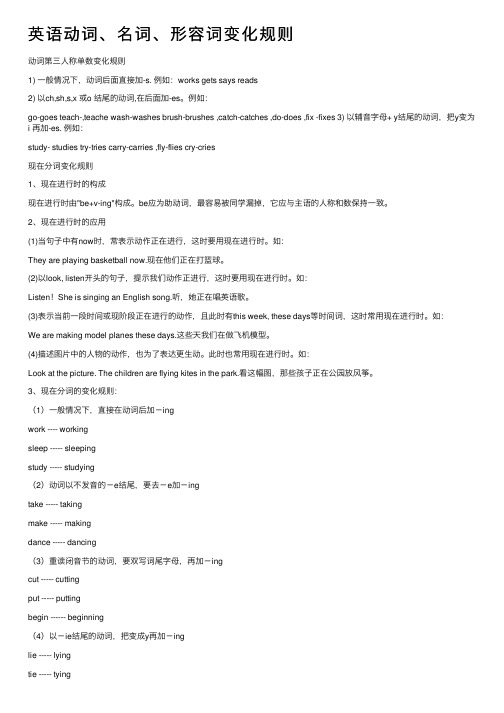
英语动词、名词、形容词变化规则动词第三⼈称单数变化规则1) ⼀般情况下,动词后⾯直接加-s. 例如:works gets says reads2) 以ch,sh,s,x 或o 结尾的动词,在后⾯加-es。
例如:go-goes teach-,teache wash-washes brush-brushes ,catch-catches ,do-does ,fix -fixes 3) 以辅⾳字母+ y结尾的动词,把y变为i 再加-es. 例如:study- studies try-tries carry-carries ,fly-flies cry-cries现在分词变化规则1、现在进⾏时的构成现在进⾏时由"be+v-ing"构成。
be应为助动词,最容易被同学漏掉,它应与主语的⼈称和数保持⼀致。
2、现在进⾏时的应⽤(1)当句⼦中有now时,常表⽰动作正在进⾏,这时要⽤现在进⾏时。
如:They are playing basketball now.现在他们正在打篮球。
(2)以look, listen开头的句⼦,提⽰我们动作正进⾏,这时要⽤现在进⾏时。
如:Listen!She is singing an English song.听,她正在唱英语歌。
(3)表⽰当前⼀段时间或现阶段正在进⾏的动作,且此时有this week, these days等时间词,这时常⽤现在进⾏时。
如:We are making model planes these days.这些天我们在做飞机模型。
(4)描述图⽚中的⼈物的动作,也为了表达更⽣动。
此时也常⽤现在进⾏时。
如:Look at the picture. The children are flying kites in the park.看这幅图,那些孩⼦正在公园放风筝。
3、现在分词的变化规则:(1)⼀般情况下,直接在动词后加-ingwork ---- workingsleep ----- sleepingstudy ----- studying(2)动词以不发⾳的-e结尾,要去-e加-ingtake ----- takingmake ----- makingdance ----- dancing(3)重读闭⾳节的动词,要双写词尾字母,再加-ingcut ----- cuttingput ----- puttingbegin ------ beginning(4)以-ie结尾的动词,把变成y再加-inglie ----- lyingtie ----- tyingdie ----- dying4、现在进⾏时的变化肯定句式:主语+be( am, is, are)+现在分词+其它.否定句式:主语+be(am, is, are) +not +现在分词+其它.⼀般疑问句:be(am, is, are) +主语+现在分词+其它特殊疑问句:疑问词+be(am, is, are)+主语+现在分词+其它difficult more difficult most difficultinteresting more interesting most interestinguseful more useful most useful3. ⽤⽐较级时常⽤than引起⼀个从句,表⽰和什么⽐较:His room is bigger than mine. 他的房间⽐我的房间⼤。
小学生名词动词形容词怎么区分

小学生名词动词形容词怎么区分
(1)名词:
名词是指某事物的名称,是最常见的词类。
它包括人名,地名,名称,物种,机构,抽象物,状态,动作,物品等。
常见的小学生名词:学生,教师,家长,教室,书,桌子,椅子,窗户,地图,板书,画笔,钢笔。
(2)动词:
动词是表示行动或状态的词类。
它表示主语在语句中所做或所处的动
作和状态。
常见的小学生动词:学习,讲课,听课,读书,散步,跳跃,写字,
跑步,玩耍,唱歌,投篮,踢足球。
(3)形容词:
形容词是描述或修饰名词的词类。
它表示名词的品质、特征、状态等
词汇。
常见的小学生形容词:美丽的,平衡的,优秀的,有趣的,乐观的,
聪明的,热情的,友好的,勤奋的,严谨的,勤快的,专注的,积极的。
小学英语动词变形表
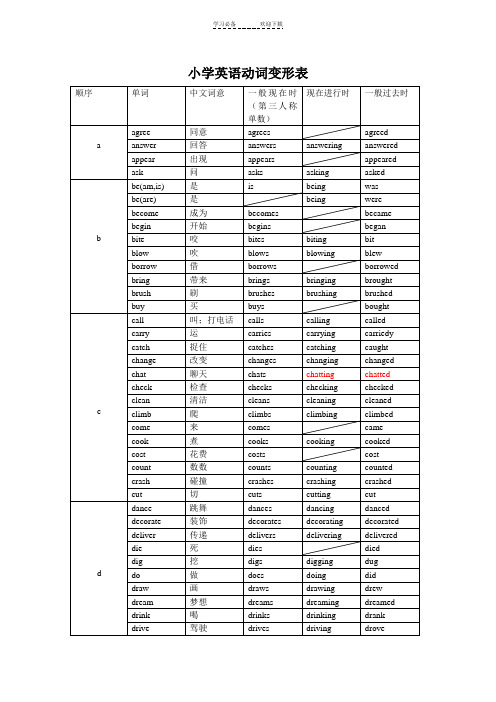
小学英语动词变形表顺序单词中文词意一般现在时(第三人称单数)现在进行时一般过去时a agree 同意agrees agreed answer 回答answers answering answered appear 出现appears appeared ask 问asks asking askedb be(am,is) 是is being wasbe(are) 是being were become 成为becomes became begin 开始begins began bite 咬bites biting bitblow 吹blows blowing blew borrow 借borrows borrowed bring 带来brings bringing brought brush 刷brushes brushing brushed buy 买buys boughtc call 叫;打电话calls calling called carry 运carries carrying carriedy catch 捉住catches catching caught change 改变changes changing changed chat 聊天chats chatting chatted check 检查checks checking checked clean 清洁cleans cleaning cleaned climb 爬climbs climbing climbed come 来comes came cook 煮cooks cooking cooked cost 花费costs cost count 数数counts counting counted crash 碰撞crashes crashing crashed cut 切cuts cutting cutd dance 跳舞dances dancing danced decorate 装饰decorates decorating decorated deliver 传递delivers delivering delivered die 死dies dieddig 挖digs digging dugdo 做does doing did draw 画draws drawing drew dream 梦想dreams dreaming dreamed drink 喝drinks drinking drank drive 驾驶drives driving drovee eat 吃eats eating ateend 结束ends endede-mail 发电子邮件e-mails e-mailing e-mailed enjoy 欣赏enjoys enjoying enjoyed excuse 打扰excuses excusedf fall 跌倒falls falling fell feed 喂feeds feeding fed feel 感觉feels feltfill 填fills filling filled finish 完成finishes finished fish 鱼,钓鱼fishes fishing fished fly 飞flies flying flew forget 忘记forgets forgot free 解放frees freeing freedg get 得到gets got give 给gives giving gave go 去goes going went grow 成长grows growing grewh happen 发生happens happened have 有has having had hear 听到hears heard help 帮助helps helping helped hike 远足hikes hiking hiked hope 希望hopes hopedi invite 邀请invites inviting invited j jump 跳jumps jumping jumpedk keep 记,保存keeps kept kill 杀kills killing killed know 知道knows knewl laugh 大笑laughs laughing laughed learn 学习learns learning learnt,learned leave 留下leaves leaving leftlend 借lends lentlike 喜欢likes likedline 排队lines lining linedlisten 听listens listening listened litter 乱扔垃圾litters littering litteredlive 生活,住lives living livedlook 看起来looks lookedlose 迷路loses losing lostlove 爱,喜爱loves lovedmake 做makes making mademark 打分marks marking markedm mean 意思是means meant meet 遇见meets meeting metmove 迁移moves moving moved n need 需要needs needed o open 打开opens openedp pack 停车packs packing packed paint 画paints painting painted phone 打电话phones phoning phoned pick 摘picks picking picked plant 种植plants planting planted play 玩plays playing played practise 练习practises practising practised prefer 愿意,更喜欢prefers preferred prepare 准备prepares preparing prepared put 放puts putting putr race 比赛races racing raced rain 下雨rains raining rained raise 举起raises raised read 读reads reading read renew 更新renews renewing renewed rest 休息rests rested return 归还returns returned ride 骑rides riding rode row 划船rows rowing rowed run 跑runs running rans save 救saves saving saved say 说says saying said see 看见sees seeing saw serve 服务serves serving served show 展示shows showing showed sing 唱歌sings singing sang sit 坐sits sitting sat skate 滑冰skates skating skated ski 滑雪skis skiing skied skip 跳skips skipping skipped sleep 睡觉sleeps sleeping slept speak 说speaks speaking spoke start 开始starts started stay 停留stays stayed study 学习studies studying studied surf 冲浪surfs surfing surfed sweep 扫sweeps sweeping swept swim 游泳swims swimming swamt take 带去takes taking took talk 谈话talks talking talked teach 教teaches teaching taught tell 告诉tells telling told thank 谢谢thanks thanked think 想thinks thinking thought throw 扔throws throwing threw touch 摸touches touching touched travel 旅游travels traveling traveled try 试tries trying tried turn 翻、转动turns turning turnedu understand 明白,理解understands understanding understood use 使用uses using usedv visit 参观,拜访visits visiting visitedw wait 等待waits waiting waited wake 醒来wakes waking woke walk 走路walks walking walked want 想wants wanted wash 洗washes washing washed watch 看watches watching watched water 浇水waters watering watered wave 挥动waves waving waved wear 穿wears wearing wore weigh 称重weighs weighing weighed welcome 欢迎welcomes welcoming welcomed win 赢wins won wish 希望wishes wished work 工作works working worked worry 担心worries worrying worried write 写writes writing wrote一般现在时第三人称单数后动词的变化内容例词直接加s末尾字母是s, x, o, ch, sh以辅音字母加y结尾,改y为i, 再加es动词have在第三人称单数后,改为has现在分词内容例词直接加ing以不发音的e结尾,去e再加ing重读闭音节动词过去式内容例词直接加ed以不发音的e结尾,直接加d辅音字母+y结尾,改y为i,再加ed重读闭音节不规则变化。
- 1、下载文档前请自行甄别文档内容的完整性,平台不提供额外的编辑、内容补充、找答案等附加服务。
- 2、"仅部分预览"的文档,不可在线预览部分如存在完整性等问题,可反馈申请退款(可完整预览的文档不适用该条件!)。
- 3、如文档侵犯您的权益,请联系客服反馈,我们会尽快为您处理(人工客服工作时间:9:00-18:30)。
5
g Old
6 wash 7 read
6 Tall 7 Short
8 play
8 Long
9 drive 10 cook 11 sing 12 draw 13 learn 14 go
9 Thin
10 Heav
11
y Big
12 Small 13 Stron
g 14 Low
15 come
15 Smart
125 coach
126 beach
127 lamp
128 scientist
129 teacher
其复数形式。
109 plane
110 rabbit
111 snow
112 Rain
113 cinema
114 train
115 Bus
116 taxi
117 restaura
118
nt Street
119 office
120 Museum
121 word
122 Country
123 factory
124 postman
小学阶段所有词汇变形汇总
第一部分:动词第三人称单数, 正在进行
序 号
原形
1 do
时,过去时变形
第三 人称 单数
正在进 行时
过去时
备注
第二部分:写出下列形容词和副 词的比较级,最高级
序号 原形 比较级 最高级 1 good
2 buy
2 bad
3 clean 4 help 5 watch
3 well
4 Youn
y
93 tomato
94 Park
95 doctor
96 people
97 lake
98 tree
99 Mouse
100 email
101 Problem
102 song
103 chicken
104 noodle
105 vegetabl
106 echopstic
107
k parent
108 people
16 get 17 know 18 speak
16 Fast 17 hard
19 dance
20 want 21 send
22 swim
23 live 24 pick 25 walk
26 show
27 say
28 talk
29 teach 30 give 31 tell
32 follow
33 stop
22 friend
23 father
24 man
25 Giraffe
26 chair
27 Desk
28 Map
29 Pear
30 Banana
31 Grape
32 strawberr y
33 fruit 34 Window
35 fan
36 computer
37 Hair
38 Cousin
39 horse
68 bird
69 cake
70 rice
71 Student
72 boy
73 mother
74 Woman
75 family
76 child
77 car
78 ball
79 toy
80 boat
81 apple
82 orange
83 waterme lon
84 kite
85 picture
86 Door
87 key
88 shoe
89 table
90 animal
91 sheep
92 Cow
42 kid 43 farmer 44 Driver 45 parent 46 Fish 47 Shop 48 bike 49 house 50 Photo 51 bottle 52 Beef 53 Soup 54 Bowl 55 Cousin 56 knife 57 spoon 58 umbrella 59 Scarf 60 glove 61 pant 62 Village 63 cloud 64 foot 65 Subway 66 ship 67 leaf 68 Lesson 69 secretary 70 reporter 71 race 72 dream 73 star 74 picture 75 gift 76 dinosaur 77 hotel 78 universit
34 ask
35 e 36 travel
44 wear 45 visit
37 join
46 take
38 type
47 have
39 use
48 share
40 feel
49 stay
41 hear 42 drink
50 worry 51 sit
43 be
52 sleep
第三部分:判断下列名词是可数名词,还是不可数名词, 若为可数名词, 请写出其复数形式。
40 carrot
41 Potato
不可数
复数形 式
序 号
名词
可数
不可数
复数形 式
52 eye
53 nose
54 arm
55 hand
56 body
57 leg
58 school
59 plate
60 duck
61 juice
62 egg
63 Milk
64 water
65 Bread
66 cat
67 panda
序 号
名词
可数
1 Ruler
2 pencil
3 eraser
4 Crayon
5 bag
6 pen
7 Book
8 box
9 face
10 Ear
11 Mouth
12 Head
13 Foot 14 Pig
15 bear
16 Elephant
17 monkey
18 zoo
19 Tiger 20 Fish
21 girl
